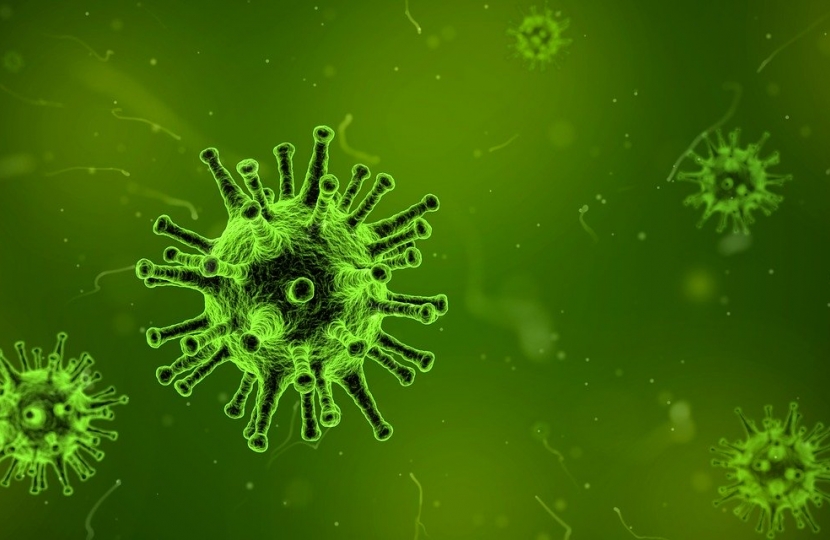This section of my website contains the latest information about the Coronavirus (COVID-19) and what you can do to help stop its spread.
You can findsome useful contacts and links to details of available support by clicking here.
Information for Businesses
Information for Charities
Information for Individuals
Information for Parents
Information about COVID-19
Coronaviruses are a ‘type’ of virus. The coronavirus we are all hearing about is called COVID-19, but you may also hear it called - coronavirus.
How serious is COVID-19?
The evidence shows us that the vast majority of people who get this virus have relatively mild symptoms and make a full recovery. But in a small percentage of cases, the virus can cause more severe symptoms. This is particularly true for people with a weakened immune system, for older people and for those with long term conditions like diabetes, cancer and chronic lung disease.
A lot of false information about this virus is being shared - it’s very important that you make sure that the information you use comes from a trusted source - all of the information on this page has been sourced from the NHS.
Latest information on the situation in Scotland is being published by The Scottish Government.
What are the symptoms?
If you are infected you may have very minor symptoms, minor symptoms or more severe symptoms, but the NHS cites two symptoms to look out for as:
- A new continuous cough
- A fever or high temperature
NHS Inform have created a short self help guide to give you advice
What should I do if I have either of the above symptoms?
- Protect others - don't call NHS 111
- Protect others - don't call, or go to your GP
- Protect others - don't go to your local hospital
If you live alone - isolate yourself at home immediately for 7 days
If you live with others - you should all isolate yourselves at home for 14 days - this 14-day period starts from the day the first person in the home noticed the symptoms.
The evidence suggests - your staying at home for 14 days will significantly reduce the number of people in the community that will become infected with the virus.
For anyone in the household who starts displaying symptoms, they need to stay at home for 7 days from when the symptoms appeared, regardless of what day they are on in the original 14-day isolation period.
If at-risk people share your home - such as those who are older and those with underlying health conditions - it is advisable for them to move out, perhaps to stay with friends or family for the whole isolation period. They need to minimise contact with others during this period whether or not they are able to move out.
For further information read this government advice on staying at home and isolating.
What should I do if self-isolation is challenging?
- You can't manage with your symptoms at home
- Your conditions get worse
- Your symptoms do not get better after 7 days
You should use the NHS Inform service or if you can't use the online service call 111
How can you avoid getting and spreading the virus?
Scientists think the virus spreads via droplets from coughs and sneezes and we know it spreads easily and can stay on surfaces for a while. It's possible that a lot of us will get it and be affected by it, but if you follow the advice below you will reduce your risk and the risk to others.
- Avoid non-essential contact with others - work from home if you can, avoid pubs, clubs, theatres and mass gatherings
- Wash your hands - with soap and water often, for at least 20 seconds. Do this before leaving home and after returning home, before eating and drinking, and after coughing or sneezing
- Cover your mouth and nose - with a tissue or your sleeve (not your hands) when you cough or sneeze - tissue in the bin and wash, or disinfect, your hands immediately
- Don't touch your face - especially your eyes, nose and mouth
- Clean surfaces - disinfect surfaces around you - especially mobiles, computers, keyboards, worktops, desks, handles...
Isolating yourself
- Stay at home for 7 (individual) or 14 (group) days - this means not going out at all - do this even if you think your symptoms are mild
- Ask for help - if you find it hard to stay at home - text, email, phone, friends, family, employers or your community to get help - but they mustn't come into your home
- Keep your distance - keep 2 metres (around 3 steps) away from others - including family - for the full period - do not go to your GP surgery or hospital
- Sleep alone - if you can sleep alone you must - it will help ensure people you live with aren't infected
- Keep washing your hands - often and for 20 seconds with soap and water helps
- Drink plenty of fluids - and take everyday pain killers like paracetamol if you need to
- Keep cleaning - so you keep surfaces clean
- Reduce contact with at risk people - people over 70, women who are pregnant and those with underlying health conditions are more at risk - help keep them safe.










